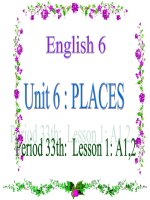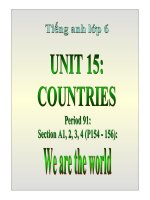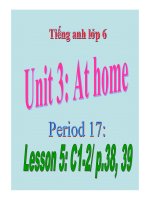BÀI HỌC TIẾNG ANH - 6 (UNIT 9)
Bạn đang xem bản rút gọn của tài liệu. Xem và tải ngay bản đầy đủ của tài liệu tại đây (866.5 KB, 10 trang )
<span class='text_page_counter'>(1)</span><div class='page_container' data-page=1>
<b>UNIT 9. CITIES OF THE WORLD</b>
A. VOCABULARY
New words Meaning Picture Example
award
[ə'wɔ:d]
Giải thưởng (n) American actress Emma stone has
won more than 30 awards.
continent
['kɔntinənt] Châu lục (n) Tom wish he can travel to all the continents over the world.
towel
['tauəl] Tháp (n) The leaning tower of Pisa is a tourist attraction in Italy.
symbol
['simbəl] Biểu tượng (n) The dove is the symbol of peace.
postcard
['poustkɑ:d Bưu thiếp My foreign friend sometimes send mebeautiful postcards.
popular
['pɔpjulə] Phổ biến,nổi tiếng(adj) Studying abroad has become very popular recently.
palace
['pælis] Cung điện (n) The palace locates on the west bank of the river.
musical
['mju:zikəl] Vở nhạc kịch (n) Yesterday,I went to see an amazing musical.
lovely
['lʌvli] Đáng yêu (adj) She has a lovely voive.
landmark
['lændmɑ:k] Danh thắng (n)(trong thành phố) Hoan Kiem lake is a famous landmark of Ha Noi.
journey
['dʒə:ni]
Chuyến đi (n) My friends and I really enjoyed our
journey to the South of Vietnam.
design
[di'zain] Thiết kế (v/n) This building has a classical design.
creature
['kri:t∫ə] Sinh vật,tạo vật (n) All living creatures need water to survive.
UNESCO world
heritage
[ju:'neskou wə:ld
'heritidʒ]
Di sản thế giới
được UNESCO
công nhận
Ha Long Bay is one of the UNESCO
world heritages.
well-known
</div>
<span class='text_page_counter'>(2)</span><div class='page_container' data-page=2>
<b>B. GRAMMAR</b>
<b>I. Thì hiện tại hồn thành( The present perfect tense)</b>
1. Cách dùng
Cách dùng Ví dụ
Diễn tả 1 hành động, sự việc xảy ra trong quá
khứ, kéo dài đến hiện tại và có khả năng tiếp tục
trong tương lai.
I have learnt English for 15 years.
Mr Nam has taught French here since 1990
Nói về sự việc vừa mới xảy ra và hậu quả của nó
cịn ảnh hưởng đến hiện tại. Thường dùng
với just, already, yet.
I have just taught English here.
Lan has learned French recently.
Diễn tả 1 hành động đã xảy ra trong quá khứ
nhưng không biết rõ thời gian hoặc không đề cập
đến thời gian.
I have seen this film, I like it very much.
She has visited Ha Long Bay.
Diễn tả 1 hành động đã xảy ra trong quá khứ
nhưng kết quả còn ở hiện tại.
Lan has cleaned the floor. => It is clean
now.
He has had a serious accident. => He’s in
the hospital now.
<b>2. Dạng thức của Hiện tại hoàn thành.</b>
<b>Câu khẳng định</b> <b>Câu phủ định</b> <b>Câu nghi vấn</b>
<b>S + have/ has + PII.</b>
CHÚ Ý:
S = I/ We/ You/ They +
have
S = He/ She/ It + has
Ví dụ:
– I <b>have graduated</b> from
my university since 2012.
- She <b>has started </b>the
assignment.
<b>S + haven’t/ hasn’t + PII.</b>
CHÚ Ý:
– haven’t = have not
– hasn’t = has not
Ví dụ:
– We <b>haven’t met</b> each other for
a long time.
– Daniel <b>hasn’t come</b> back his
hometown since 2015.
<b>Q: Have/Has + S + PII?</b>
<b>A: Yes, S + have/ has.</b>
<b> No, S + haven't / hasn't.</b>
Ví dụ:
<b>-</b> <b>Have</b> you ever <b>travelled</b> to
Vietnam?
– <b>Has</b> she <b>arrived </b>London yet?
Yes, she has./ No, she hasn’t.
<b>3. Dấu hiệu nhận biết</b>
<i><b>- just, recently, lately:</b></i> gần
đây, vừa mới
<i><b> - already:</b></i> rồi
<i><b> - before:</b></i> trước đây
<i><b> - ever:</b></i> đã từng
<i><b>- never:</b></i> chưa từng, không
bao giờ
<i><b>- for + N – quãng thời gian:</b></i> trong khoảng (for a year, for a
long time, …) ví dụ: for 2 months: trong vịng 2 tháng
<i><b> - since + N – mốc/điểm thời gian:</b></i> từ khi (since 1992, since
June, …)
<i><b> - so far = until now = up to now = up to the present:</b></i> cho
đến bây giờ
</div>
<span class='text_page_counter'>(3)</span><div class='page_container' data-page=3>
<i><b> - yet:</b></i> chưa (dùng trong câu
phủ định và câu hỏi)
<b>4. Cách chia động từ ở thì Hiện tại hồn thành</b>
Động từ trong thì HTHT được chia theo 1 trong 2 cách sau:
- Nếu là động từ có quy tắc thì thêm đi “ed”. Áp dụng quy tắc thêm đuôi -ed vào động
từ.
- Nếu là động từ bất quy tắc thì xem ở cột 3 trong bảng động từ bất quy tắc.
Ví dụ:
-He has just bought a new house.(Anh ấy vừa mới mua một ngôi nhà mới.)
-I’ve known her for ten years.(Tơi đã biết cơ ấy 10 năm rồi.)
5.So sánh thì hiện tại hoàn thành và từ quá khứ đơn.
Thì hiện tại hồn thành <b> Thì quá khứ đơn</b>
Cách dùng <b>-Dùng để diễn tả một hành động bắt đầu ở </b>quá khứ kéo dài đến hiện tại và có thể tiếp
tục ở tương lai.
-Dùng để diễn tả hành động xảy ra trong quá
khứ nhưng không rõ thời gian hoặc không
đề cập đến thời gian.
-Dùng để diễn tả một hành động đã
hoàn toàn kết thúc trong quá khứ.
-Dùng để diễn tả hành động đã xảy ra
tại thời điểm xác định trong quá khứ.
Ví dụ -She has lived in Ho Chi Minh city for 8 years.(Cô ấy đã sống ở thành phố Hồ Chí
Minh được 8 năm rồi.)
=>Bây giờ cô ấy vẫn sống ở Hồ Chí Minh.
-Someone has stolen my computer(Ai đó đã
ăn trộm máy tính của tơi.)
-She lived in Ho Chi Minh city 8 years
ago.(Cô ấy đã sống ở thành phố Hồ Chí
Minh cách đây 8 năm.)
=>Bây giờ cơ ấy khơng sống ở thành
phố Hồ Chí Minh nữa.
-Someone stole my computer yesterday.
(Hơm qua ai đó đã ăn trộm máy tính của
tơi.)
<b>BÀI TẬP VẬN DỤNG CƠ BẢN</b>
<b>Bài 1:Cho dạng quá khứ phân từ (V3) của các đọng từ sau,dùng bảng động từ bất </b>
<b>quy tắc nếu cần.</b>
V V3 V V3
Be Speak (nói)
Want (muốn) Leave (rời đi)
</div>
<span class='text_page_counter'>(4)</span><div class='page_container' data-page=4>
Run (chạy) Tell (nói)
Go (đi) Come (đến)
Write (viết) Forget (qn)
Send (gửi) Give (đưa)
Cry (khóc) Look (nhìn)
See (nhìn) Work (làm việc)
Take (lấy) Win (chiến thắng)
Live (sống) Cut (cắt)
Buy (mua) Steal (lấy)
Know (biết) Fly (bay)
Do (làm) Sing (hát)
Eat (ăn) Grow (phát triển)
<b>Ex2. Fill in “have/has”</b>
1. During the five years, John ___ had 15
different jobs.
2. He _____ worked in a banking sector.
3. Teddy _____ been a teacher since
2004.
4. I ____ been on holiday for six days.
5. I and Kate ____ started our own
company this year.
6. _______ your mother learned how to
drive.
7. They ___ never been to Madrid.
8. _____ you ever met anyone famous?
9. We ____ been married for two years.
10. Jude ___ not seen my new address.
<b>Ex 3. Write short answer for these questions</b>
1. Has the baby slept? --> Yes, ___________/ No, _________
2. Have Jim and you called your father? --> Yes, ___________/ No, _________
3. Has he had dinner yet? --> Yes, ___________/ No, _________
4. Have they called me? --> Yes, ___________/ No, _________
5. Has Sharah read that book? --> Yes, ___________/ No, _________
6. Have you read Romeo and Juliet? --> Yes, ___________/ No, _________
7. Has she left school? --> Yes, ___________/ No, _________
8. Has the president visited any African countries? --> Yes, ________/ No, _______
<b>Ex 4. Write these sentences with Present perfect tense in negative, positive and </b>
<b>question</b>
1. He has lived here for three years.
(-)____________________________
(?) __________________________
2.(+) __________________________
(-) We haven’t been here for two weeks.
(?) ___________________________
3.(+) ___________________________
(-)___________________________
(?) Have they missed the train?
</div>
<span class='text_page_counter'>(5)</span><div class='page_container' data-page=5>
(-)_____________________________
(?)_____________________________
5.(+) ___________________________
She hasn’t passed the exam.
(?)___________________________
6.(+) ___________________________
(-)___________________________
Have you met his mother?
7. We have eaten too much chocolate.
(-)____________________________
(?)____________________________
8.(+) ____________________________
I haven’t known David for ten years.
(?)_____________________________
9.(+) ____________________________
(-)______________________________
Has she read the book?
</div>
<span class='text_page_counter'>(6)</span><div class='page_container' data-page=6>
1. She has been in Vung Tau ... January.
2.Ha and Nam have seen this film ... 7
o’clock.
3. I have sent her 3 letters ... last
week.
4. My sister has worked at that
hospital ... 5 years.
5. I have known her ... we were at
elementary school.
6. Nam has become a footballer ... 3
years.
7. She’s been in London ... Monday.
8. Mike has lived in Hanoi ... four
years.
</div>
<span class='text_page_counter'>(7)</span><div class='page_container' data-page=7></div>
<span class='text_page_counter'>(8)</span><div class='page_container' data-page=8>
<b>Bài 8:Chia động từ trong ngoặc ở thì hiện tại hồn thành.</b>
1. I (live) here since 1989.
2. They (work) for this factory for 20 years.
3. He (read) this novel three times.
4. Hoa and I (know) each other since we were at the same class.
5. I (not/see) her since last month.
6. I (not/work) have not worked today.
7. We (buy) a new lamp.
8. We (not/plan) our holiday yet.
9. Where (be/you) ?
10. He (write) five letters.
11. (be/you) at school?
12. School (not/start) yet.
13. (speak/he) to his boss?
14. No,he (have/not) the time yet.
15. The cat (just/catch) a mouse.
16. He (already/invite) his friends.
17. Julia (make) a table with three columns.
18. The teacher (lose) the keys,so he can’t open the door.
19. I (just/clean) my bike.
20. My friends (give up) smoking.
<b> II. So sánh nhất với tính từ dài (superlatives of long adjectives)</b>
Trong tiếng anh,cấu trúc câu so sánh nhất được dùng để so sánh người (hoặc vật)
với tất cả người (hoặc vật) trong nhóm.
Trong câu so sánh nhất,tính từ sẽ được chia làm hai loại là tính từ dài và tính từ
ngắn,trong đó:
- Tính từ ngắn là những tính từ có 1 âm tiết.Ví dụ:tall,high,big,...
- Tính từ dài là những tính từ có từ 2 âm tiết trở lên.Ví dụ :expensive,intelligent,...
* Xem lại cấu trúc so sánh nhất đối với tính từ ngắn trong bài Unit 5.
Cấu trúc so sánh nhất đối với tính từ dài
Cấu trúc S + to be + the most + adj + (danh từ)
Ví dụ
This exercise is the most difficult.
This is the most interesting film I’ve ever seen
Ngoc is the most intelligent student
Lưu ý
Để nhấn mạnh ý trong câu so sánh nhất ,ta thêm “much” hoặc “by far”
vào sau hình thức so sánh.
He is the most famous by far.
Chú ý: Với tính từ dài, ta cần thêm “the most” vào trước tính từ:
Ví dụ:
Tính từ dài
So sánh nhất
</div>
<span class='text_page_counter'>(9)</span><div class='page_container' data-page=9>
Beautiful(xinh đẹp)
The most beautiful(xinh đẹp nhất)
Boring(nhàm chán)
The most boring(nhàm chán nhất)
Famous(nổi tiếng)
The most famous(nổi tiếng nhất)
<b>BÀI TẬP VẬN DỤNG CƠ BẢN</b>
<b>Bài 1:Hoàn thành các câu sau,sử dụng dạng so sánh nhất của tính từ trong </b>
<b>ngoặc.</b>
1. My dad is dad in the world.(funny)
2. whales are animals in the world.(heavy)
3. mice are animal in the world.(cute)
4. My bedroom is room in my house.(comfortable)
5. I am cook in the world.(bad)
6. For English people,Japanese is language to learn.(difficult)
7. That was film I’ve seen.(sad)
8. My sister is person I know.(tidy)
9. My grandmother is person in my family.(old)
10. That was book I’ve ever read.(strange)
11. I’ve ever travelled is fromm London to San Francisco.(far)
12. What’s animal in your country?(dangerous)
13. Spain is country in Europe.(sunny)
14. What’s place you’ve ever visited.(hot)
15. What’s you’ve ever stayed up at night?(late)
16. It’s a very nice house.It’s house in the street.(nice)
17. This is a cheap restaurant.It’s I’ve ever been.(cheap)
18. She is a very good tennis player.Her trainer says she is .(good)
19. He’s a very dangerous criminal.The police say he is in the
country.(dangerous)
20. We should buy him a beautiful present.Last year we give him gift
of all in his birthday.(beautiful)
<b>Bài 2</b>
:chọn và cho dạnh so sánh nhất của tính từ dưới đây rồi điền vào chỗ trống.Funny high delicious easy cold boring lucky smart
Dirty rich valuable bad large cheap long scary
1. Yesterday was day of the year.I almost froze to death walking
home from school!
2. That was movie I’ve ever seen.I almost walked out in the middle.
3. Please give me your recipe.That is cake I’ve ever eaten.
4. Jerry is student in our class.He gets the top grades in every
course.
5. Bod told story last night.I couldn’t stop laughing.
6. Whales are animals in the world.
</div>
<span class='text_page_counter'>(10)</span><div class='page_container' data-page=10>
8. Marie is person I know.She has won the lottery four times!
9. He is speaker I have ever heard.Half the audience fell asleep
during his speech.
10. Mount Everest is mountain in the world.
11. That is painting in the art gallery.It’s worth a million dollars.
12. Bill Gates is one of men in the world.
13. I finished the exercise in five minutes.It was homework the
teacher has ever give us.
14. Arthur hates to clean.He has apartment I’ve ever seen.
15. My dinner only cost $6,00.That must be restaurant in town.
16. I was afraid to turn off the lights last night.That was show I’ve
ever watched.
<b>Bài 3: Viết các câu so sánh nhất,dùng các từ gợi ý.</b>
1. Nga / beautiful / her class.
_______________________
2. We / like / wearing / late / fashion.
_______________________
3. You / pretty / girl / in class.
_______________________
4. The red dress / attractive / in the shop.
_______________________
5. I / always / tell fun / jokes.
_______________________
6. Who / short / person / in your family ?
_______________________
7. Who / independent / person / you / know ?
_______________________
8. My brother / tall / in the class.
_______________________
9. Who / good / singer / in the world ?
_______________________
</div>
<!--links-->









